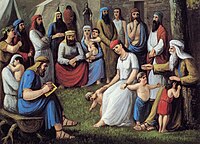King Mosiah II
This article uses secondary sources that critically analyze them. (April 2020) ) |
The topic of this article may not meet Wikipedia's general notability guideline. (October 2023) |
| Part of a series on |
| People in the Book of Mormon |
|---|
 |
In the Book of Mormon, Mosiah (/moʊˈsaɪ.ə, -ˈzaɪ.ə/),[1] King Benjamin's son and Mosiah I's grandson, is king of the Nephite nation from about 124 BC to 91 BC. The Book of Mosiah is named after Mosiah. Mosiah is also a prophet and is described by Ammon as a "seer" who can translate records.[2]
Narration
Mosiah is one of the sons of King Benjamin. The Book of Mormon says he is well educated in the languages of his ancestors, the records on the
At this point, the group he had sent towards Lehi-Nephi has helped the people of Zeniff, now led by Zeniff's grandson Limhi, escape from the Lamanites. They travel to Zarahemla and are welcomed into Mosiah's protection, followed shortly later by the people of Alma who had also escaped from Lamanite control. King Mosiah gathers all the people together to share the records of Zeniff and Alma. He also gives Alma authority to organize churches in the land, but members of the younger generation work to draw away the believers, including Mosiah's own sons. He declares to his people that they should all be equal and everyone should work to support themselves, which leads to another period of peace.[4]
Mosiah's sons, who had earlier worked against the church, had converted and gone off to convert the Lamanites. Because none of them want to be king, Mosiah gathers the records he as access to, including the plates of brass, the plates of Nephi, all of his own writings, and the twenty four plates brought by Limhi's people. He translates the twenty four plates, which talk about people who came from the Tower of Babel. He then gives all of these records to Alma the Younger, and instructs him to keep his own records as well. Mosiah warns his people against the dangers of a bad king and suggests they instead use a system of judges.[5]
Sons of Mosiah
The sons of Mosiah is the collective name used in the
Interpretation
Leadership rights
Grant Hardy proposes that Mosiah's suggestion to use a system of judges stems not only from the danger of a bad king but also from concerns over who held the right to the throne. As Zarahemla's past leaders came from the line of King Zedekiah, their descendants could have put Mosiah's authority in question.[7]
References
- IPA-ified from «mō-sī´a or mō-zī´a»
- ^ Mosiah 8:13–17.
- ^ Thomas 2016, p. 73-75.
- ^ Thomas 2016, p. 82-84.
- ^ Thomas 2016, p. 85-86.
- ^ "Mosiah 27". churchofjesuschrist.org. Retrieved 2017-12-31.
- Wikidata Q122259222.
Sources Cited
- Wikidata Q123196681.
Further reading
- ISBN 0-87747-297-1
